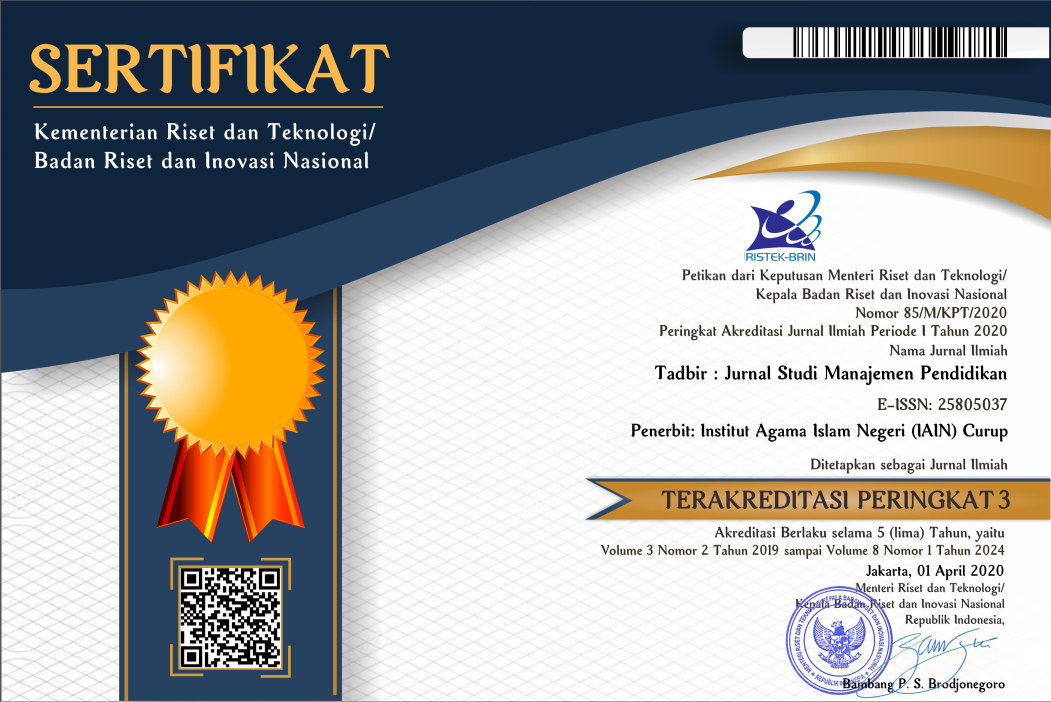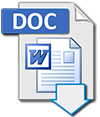The Role of Organizational Behavior in Creating Professional Human Resources
DOI:
https://doi.org/10.29240/jsmp.v7i2.6996Keywords:
Organizational Behavior Management, Professional Human Resources, Islamic Religious Education TeachersAbstract
Downloads
References
Anwar, P. (2000). Corporate Human Resource Management . Bandung: Rosdakarya Youth.
Arikunto, S. (2013). Research Procedures . Jakarta: PT. Rineka Cipta.
Bukit, B., Malusa, T., & Rahmat, A. (2017). Human Resource Development. In Zahir Publishing (First). Yogyakarta: Zahir Publishing.
Casio, WF (1992). Managing human resources: productivity, quality of work life, profit . Singapore: McGraw Hill International.
Covey, S. R. (1992). Principle-centered leadership . London: Simon and Schuster.
Djatmiko, YH (2008). Organizational Behavior . Bandung: Alphabet.
Hasibuan, S. . (2000). Human Resource Management . Jakarta: Bumi Akasara.
Haslam, SA, Reicher, SD, & Platow, MJ (2015). Leadership: Theory and practice. APA Handbook of Personality and Social Psychology , 2 .
K, P. (1996). Leaders And Leadership In Management . Jakarta: Rineka Cipta.
Kurniadin, D., & Muchali, I. (2012). Education Management: Concepts & Principles of Education Management . Yogyakarta: Ar-ruzz Media.
Miles, BB, & Huberman, AM (1993). Qualitative Data Analysis . Jakarta: UIPress.
Moleong, LJ (2001). Qualitative Research Methodology . Bandung: Rosdakarya Youth.
Muhammadin, A., Munthe, RN, Warella, SY, Sari, AP, Tjiptadi, DD, Tampubolon, MR, & Sugiarto, M. (2021). Organizational Theory and Behavior . Medan: Our Writing Foundation.
Mukhyi, MA, & Hudiyanto, H. (1996). Introduction to Human Resource Management (First). Depok: Gunadarma.
Mulyasa, E. (2013). Principal Management and Leadership . Jakarta: Earth Script.
Murugan, MS (2016). Nature and scope of management. Management Principles Practices . London: Sage Publications. Retrieved from http://www.newagepublishers.com/servlet/nagetbiblio?bno-000951
Muwahid, S. (2012). Principal's Leadership Style in Improving Teacher Performance . UIN Maulana Malik Ibrahim Malang.
Nawawi, Uha, I. (2013). Leadership Organizational Culture and Performance (The Process of Formation, Growth and Development, Dynamics, and Organizational Performance) . Jakarta: Prenada Media Group.
Posner, K. (2004). The Leadership Challenge . Jakarta: PT. Primary Script Surge.
Purnomo, H. (2017). Development of Human Resource Management (First). Yogyakarta: Publishing Group CV. Archipelago Bildung.
Rahayu, S. (2017). Interpersonal Communication of Principal Leadership and Organizational Work Culture on Work Motivation and Its Impact on Junior High School Teacher Job Satisfaction. Education Management , 12 (1), 73–84. https://doi.org/10.23917/jmp.v12i1.2977
Rivai, V. (2008). Education Management. Analysis of Theory and Practice . Jakarta: Raja Grafindo Persada.
Robbins, SP, & Judge, TA (2013). Organizational Behavior (15th ed.). New Jersey.: Prentice Hall.
Santosa, D. (2008). Leadership Theories . Solo: UNS Press.
Schein, EH (1985). Organizational Culture and Leadership . San Francisco: Jossey-Bass.
Siagian, P, S. (2003). Leadership Theory and Practice . Jakarta: PT. Rineka Cipta.
Siti Farikhah, W. (2018). Education Management . Yogyakarta: Aswaja Presindo.
Soeprapto, T. (2006). Strengthening capacity with human resources . Yogyakarta: Media Pressindo.
Soeprayitno. (2020). The relationship between knowledge management, leadership style, and work motivation: Evidence from an Islamic boarding school. International Journal of Business and Society , 21 (2), 945–954. Retrieved from https://api.elsevier.com/content/abstract/scopus_id/85088273934
Soewarso, H. (2001). Total Quality Management . Yogyakarta: Andi Publisher.
Stephen P. Robbins. (2002). Principles of Organizational Behavior . Jakarta: Erlangga.
Sugiyono. (2007). Educational Research Methods: Quantitative, Qualitative and R&D . Bandung: Alphabet.
Sukmadinata, NS (2006). Educational Research Methods . Bandung: PT. Rosdakarya youth.
Thoha, M. (1995). Leadership in Management . Jakarta: PT. King of Grafindo Persada.
Thoha, M. (2010). Leadership in management . Jakarta: Grafindo Persada.
Thoyib, M. (2012). Contemporary Islamic Education Quality Management . Jakarta: Director General of Education, Ministry of Religion.
Wahab, AA (2008). Organizational anatomy and educational leadership . Bandung: Alphabet.
Wibawa, AEY (2021). Relationship between Madrasah Principal Leadership and Teacher Work Achievement with the Progress of Madrasah Aliyah in Surakarta Regency. Berajah Journal , 1 (1).
Yukl, G. (2010a). Leadership in organization . Jakarta: PT. Index.
Yukl, G. (2010b). Leadership in Organizations . New Jersey: Pearson Merril Prentice Hall.












 This work is licensed under a
This work is licensed under a 